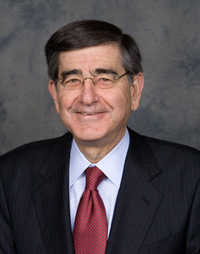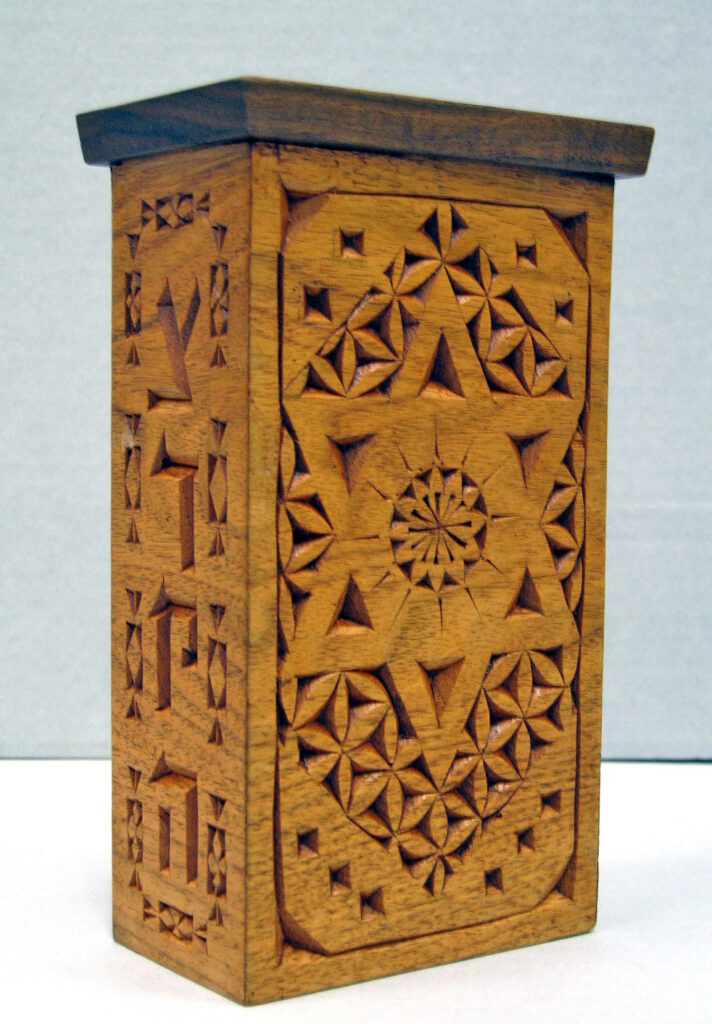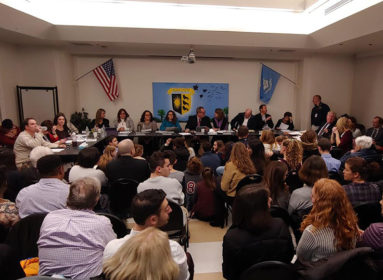
A Conversation with … David S. Federman

FARMINGTON – “If ever there was a year when charitable contributions are important, it’s this year.”
Those are the of the words of David S. Federman, CPA, attorney and founding and managing partner of Federman, Lally & Remis LLC, a boutique accounting firm located in Farmington, when asked what people should be thinking about now in terms of year-end charitable giving.
With more than 45 years experience as a tax professional, Federman works with closely-held companies and complex tax and family matters including succession planning. His expertise includes manufacturing, real estate and distribution as well as working with high net worth individuals.
But as 2020 comes to a close, Federman’s concern in terms of charitable donations goes way beyond the issues of tax deductions.
Which is apropos for someone who has long been active civically and philanthropically in both Hartford’s Jewish community and the greater community.
Among his numerous communal activities, Federman has served as chairman of the board for the New England Region of the Arthritis Foundation as well as chairman of the board of the Arthritis Foundation of Northern and Southern New England. He served on the National Board of Trustees for the Arthritis Foundation. His efforts on behalf of the Arthritis Foundation earned him in 2017 the organization’s Lifetime Achievement Award.
An esteemed leader of Greater Hartford’s Jewish community, Federman is a life officer of the Mandell Jewish Community Center, where he is also a past president. He previously served as annual campaign chairman of the Jewish Federation of Greater Hartford, where he is currently a life trustee. He is also a trustee and corporate of Hebrew Health Care in West Hartford and a member of the Board of Governors and the Major Gifts Committee of Hartford Hospital.
“David has held numerous leadership roles at the JCC and in our community,” MandelL JCC Executive Director David Jacobs told the Jewish Ledger. “His commitment to Jewish life is evident in all of his leadership and volunteer activities.”
And it is commitment that Federman stressed when the Jewish Ledger recently spoke with him about the important of giving, as his tips on end-of-year charitable giving strategies.
JEWISH LEDGER: Why do you believe that charitable giving is more important now than ever before?
DAVID FEDERMAN: We know, from our clients and the charities where I am involved, that all of the charities are hurting, big time. They can’t do events and memberships are down. The Jewish community – whether it’s the JCC or JFS [Jewish Family Service] or any other agency – have got to be suffering.
They did get those paycheck protection loans, which was huge and very helpful. But they have used them. That money is already gone and the year isn’t really up. This isn’t going to be over at least, I think, for another year, and people aren’t going to come back to the charities so quickly.
And it’s not just the Jewish agencies. Think about things like the Hartford Stage or the Bushnell. They are basically closed.
So this year, for so many reasons, is a year when people need to be helpful to charities however they can. Of course, the problem is that so many people can’t because they too are hurting.
If so many people are hurting, who is there to help these charities during this difficult time?
I think that it falls to the people who I’ll call the “usual suspects” –those who always help the community and are the largest contributors. My experience has been that while donors, especially those at the higher bracket levels, are aware of tax benefits, that’s not really why they are making donations.
The people who make the largest donations are the people that care the most about the charities they are involved in; the places for which they have a passion.
They’re going to have to do even more just to keep things even. Because I think that what we call the “modest contributors” aren’t able to do anything right now.
We can talk about giving strategies, but if you don’t have a job or you’re on unemployment, you’re not giving; you are more in need.
That’s how I look at it from a purely philosophical or realistic point of view.
How do you look at it as a tax professional?
From a tax point of view, right now someone using the so-called standard deduction for taxes doesn’t get any tax benefit whatsoever for charitable contributions. Those tend to be people making relatively modest contributions.
So that has made it even tougher for anyone thinking in terms of taxes.
But in 2020, they made a small change, so you can get $300 as a tax deduction over and above the standard deduction for charitable contributions. So people can get a little bit of tax benefit.
For the larger donors, 100 percent of their charitable contributions can be deductible for tax purposes – 100 percent of what we call AGI [adjusted gross income]. It used to be limited to 50 percent, then 60 percent. But this year, they can offset 100 percent of their so-called adjusted income by charitable contributions. So it’s a good year to do that.
How did these changes come about?
Through The Cares Act. (The CARES Act provides fast and direct economic assistance for American workers and families, small businesses, and preserves jobs for American industries. The Coronavirus Aid, Relief, and Economic Security (CARES) Act was passed by Congress with overwhelming, bipartisan support and signed into law by President Trump on March 27th, 2020.)
It’s all part of the post-Covid relief law they passed.
Are there any other tips you can share?
In terms of other strategies, people could also use their IRA retirement plans. They can make what they call “qualified charitable donations,” which means they can reduce the taxability of their retirement plan required payment by whatever they paid directly to charities. But it has to be paid directly to the charities.
The real savings there is the state taxes because Connecticut doesn’t allow a deduction for itemized deductions like charity.
People can also donate appreciated securities and avoid capital gains taxes.
Those are some of the strategies. In theory, depending on who gets elected in 2020, tax rates may go up; the tax benefit of charitable deductions may get greater. But all of that is very uncertain.
I guess your most important tip when it comes to charitable giving is to give the extent you canduring this difficult year?
Yes, to me, this is the year to dig down if you can. The charities need it more than ever.
I’ve been doing this for a long time. And we always say this is the most important year to support [charitable organizations]. But this actually might be the most important year ever.
Jewish Future Pledge and Jewish Federations of North America partner to ensure the future of Jewish giving

(JNS Wire) – Today, Jewish Future Pledge and The Jewish Federations of North America (JFNA) announced a new partnership, which will advance a shared vision and commitment to secure a vibrant Jewish future, sparking critical intergenerational conversations about Jewish values and proliferating a culture of legacy giving.
The partnership comes at a critical time for the Jewish community as two seismic forces are converging at the same time. The social and economic impact of the COVID-19 pandemic has left the Jewish community more uncertain about its future than ever before and comes during the largest transfer of wealth in history. According to Center on Wealth and Philanthropy at Boston College $6.3 trillion could be allocated to charity over the next 55 years. The Jewish Future Pledge seeks to leverage this wealth transfer to secure the financial future of the Jewish people by directing hundreds of billions of dollars toward Jewish and Israel-related causes
“The ripple effect of gifts secured decades ago is being felt in a profound way as this crisis unfolds,” said JFNA’s Chairman of the Board of Trustees, Mark Wilf. “Legacy gifts made today will have the ability to secure our community well into the future. That is why we are excited about partnering with the Jewish Future Pledge.”
The Jewish Future Pledge calls on all Jews to sign a pledge that commits half or more of the charitable giving in their estate plan to support the Jewish people and/or the State of Israel. This new collaboration with Jewish Federations will engage ten local Jewish Federations in a two-year pilot program and a set of JFNA’s national affinity groups for expanded programs in the coming years.
“The Jewish Future Pledge is thrilled to partner with the most significant Jewish umbrella organization in the U.S.–The Jewish Federations of North America–as we pave the way today for the Jewish communities of tomorrow,” said Jewish Future Pledge co-founder, Mike Leven. “Jewish Federations have extraordinary reach into Jewish communities big and small. This strategic partnership will accelerate our new movement’s expansion across the country as we work to secure the funds needed to ensure that Jewish life is sustained for generations to come,” said Leven.
“We must act now with passion and creativity to ensure that future generations have the resources to build and maintain vibrant and dynamic Jewish institutions. Together, the Jewish Future Pledge and The Jewish Federations of North America are uniquely positioned to make an impact in communities large and small all across the country. I am confident that the seeds planted today through this new partnership will blossom for years to come,” said Mark Silberman, Chairman of the Jewish Future Pledge and JFNA National Board Member.
About the Jewish Future Pledge: The Jewish Future Pledge is a worldwide movement working to ensure that vibrant Jewish life continues for generations to come. It calls on all Jews to pledge that half or more of the charitable giving in their estate plan will support the Jewish people and/or the State of Israel.
About the Jewish Federations of North America: The Jewish Federations of North America (JFNA) represents 146 Jewish Federations and over 300 Network communities, which raise and distribute more than $3 billion annually and through planned giving and endowment programs to support social welfare, social services and educational needs. The Federation movement, collectively among the top 10 charities on the continent, protects and enhances the well-being of Jews worldwide through the values of tikkun olam (repairing the world), tzedakah (charity and social justice) and Torah (Jewish learning).
Learn more about us at www.JewishFederations.org.








 Southern New England Jewish Ledger
Southern New England Jewish Ledger













